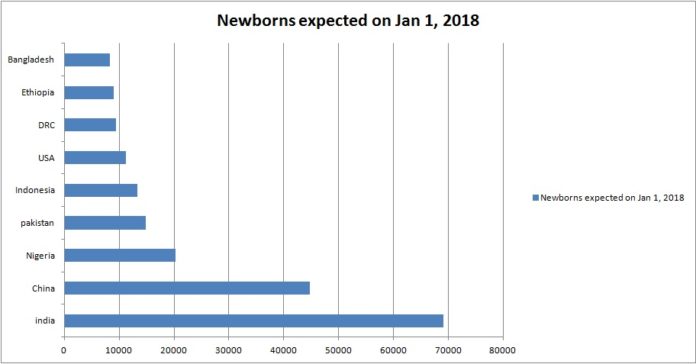On New Year 2018, some 20,210 babies were born in Nigeria on the first day of the year, according to a population-based projection by the United Nations Children’s Fund, but many did not survive the day.
Only India and China had the highest number of babies born on the day, according to population projections run by the Fund.
The first baby of the year will be born on Christmas Island in Kiribati, a small island in the Pacific, and the last baby on the first day of 2018 is expected born in the United States.
Half of all births on January 1 will be in nine countries.
- India — 69,070
- China — 44,760
- Nigeria — 20,210
- Pakistan — 14,910
- Indonesia — 13,370
- The United States of America — 11,280
- The Democratic Republic of Congo — 9,400
- Ethiopia — 9,020
- Bangladesh — 8,370
UNICEF worries some of the babies will not survive their first day.
Last year, at least 2,600 children died every day—on the day they were born.
For almost 2 million newborns, their first week was also their last. In all, 2.6 million children died before the end of their first month, according to the Fund.
Eight in 10 deaths of all newborns are due to preventable and treatable causes, such as premature birth, complications during delivery, and infections like sepsis and pneumonia.
“This New Year, UNICEF’s global resolution is to help give every child more than an hour, more than a day, more than a month – more than survival,” said Terry Durnnian, Acting Representative of UNICEF Nigeria.
“We call on the government and partners to join the fight to save the lives of millions children by providing proven, low-cost solutions.”
The Fund plans to launch in January the Every Child Alive campaign—to demand and deliver affordable, quality health care solutions for every mother and newborn.
The campaign includes steady supply of clean water and electricity at health facilities, the presence of a skilled health attendant during birth, disinfecting the umbilical cord, breastfeeding within the first hour after birth, and skin-to-skin contact between the mother and child.
“We are now entering the era when all the world’s newborns should have the opportunity to see the 22nd Century,” added acting representative Durnnian.
“Unfortunately, nearly half of the children born this year likely won’t. A child born in Sweden in January 2018 is most likely to live to 2100, while a child from Nigeria would be unlikely to live beyond year 2072.”
























